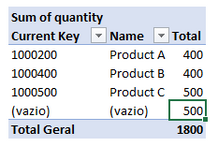Fabric Data Days starts November 4th!
Advance your Data & AI career with 50 days of live learning, dataviz contests, hands-on challenges, study groups & certifications and more!
Get registered- Power BI forums
- Get Help with Power BI
- Desktop
- Service
- Report Server
- Power Query
- Mobile Apps
- Developer
- DAX Commands and Tips
- Custom Visuals Development Discussion
- Health and Life Sciences
- Power BI Spanish forums
- Translated Spanish Desktop
- Training and Consulting
- Instructor Led Training
- Dashboard in a Day for Women, by Women
- Galleries
- Data Stories Gallery
- Themes Gallery
- Contests Gallery
- Quick Measures Gallery
- Visual Calculations Gallery
- Notebook Gallery
- Translytical Task Flow Gallery
- TMDL Gallery
- R Script Showcase
- Webinars and Video Gallery
- Ideas
- Custom Visuals Ideas (read-only)
- Issues
- Issues
- Events
- Upcoming Events
Join us at FabCon Atlanta from March 16 - 20, 2026, for the ultimate Fabric, Power BI, AI and SQL community-led event. Save $200 with code FABCOMM. Register now.
- Power BI forums
- Forums
- Get Help with Power BI
- DAX Commands and Tips
- Measure to sum a column bases on another tables co...
- Subscribe to RSS Feed
- Mark Topic as New
- Mark Topic as Read
- Float this Topic for Current User
- Bookmark
- Subscribe
- Printer Friendly Page
- Mark as New
- Bookmark
- Subscribe
- Mute
- Subscribe to RSS Feed
- Permalink
- Report Inappropriate Content
Measure to sum a column bases on another tables column
Hello guys, it's my first post here and I'm very glad to be part of this forum.
Recently I'm trying to deal with a logical sum in DAX and to be honest I not dealing with it really well...
My problem is:
I have 3 tables:
I want to sum the MB52[Quantity] based on Current and Old Keys, reaching this result:
Identifying [Current Key] and suming the quantity of the [Old. Key] with owns [Current Key] quantity.
I tried this code but with no sucess 😞
[Sum. Quantity] =
IF
(
'KEYS'[Old. Key] <> "";
CALCULATE(SUM(MB52[Quantity]) ; MAX(MB52[Key]) = MAX('KEYS'[Old. Key])) + CALCULATE(SUM(MB52[Quantity]) ; MAX(MB52[Key]) = MAX('KEYS'[Current Key]));
SUM(MB52[Quantity])
)
I apreciate a lot your help and thanks anyway 🙂
Solved! Go to Solution.
- Mark as New
- Bookmark
- Subscribe
- Mute
- Subscribe to RSS Feed
- Permalink
- Report Inappropriate Content
Hi @paulomartins ,
Here are the steps you can follow:
1. Create measure.
Measure =
var _old=
CALCULATE(SUM('MB52'[Quantity]),
FILTER(ALL(MB52),
'MB52'[Key]=MAX('Keys'[Old.Key])))
var _current=
CALCULATE(SUM('MB52'[Quantity]),
FILTER(ALL(MB52),
'MB52'[Key]=MAX('Keys'[Current Key])))
var _sum=
_old + _current
return
IF(
_sum = BLANK() ,0,_sum)Measure 2 =
SUMX(
FILTER(ALL('Keys'),
'Keys'[Current Key] = MAX('Products'[Currrent Key])),
[Measure])2. Result:
If you need pbix, please click here.
Best Regards,
Liu Yang
If this post helps, then please consider Accept it as the solution to help the other members find it more quickly
- Mark as New
- Bookmark
- Subscribe
- Mute
- Subscribe to RSS Feed
- Permalink
- Report Inappropriate Content
Hi @paulomartins ,
Here are the steps you can follow:
1. Create measure.
Measure =
var _old=
CALCULATE(SUM('MB52'[Quantity]),
FILTER(ALL(MB52),
'MB52'[Key]=MAX('Keys'[Old.Key])))
var _current=
CALCULATE(SUM('MB52'[Quantity]),
FILTER(ALL(MB52),
'MB52'[Key]=MAX('Keys'[Current Key])))
var _sum=
_old + _current
return
IF(
_sum = BLANK() ,0,_sum)Measure 2 =
SUMX(
FILTER(ALL('Keys'),
'Keys'[Current Key] = MAX('Products'[Currrent Key])),
[Measure])2. Result:
If you need pbix, please click here.
Best Regards,
Liu Yang
If this post helps, then please consider Accept it as the solution to help the other members find it more quickly
- Mark as New
- Bookmark
- Subscribe
- Mute
- Subscribe to RSS Feed
- Permalink
- Report Inappropriate Content
It is what I was trying to do!
Thank you so much @Anonymous, you helped me to reach the result and learn a lot about DAX with this problem!
- Mark as New
- Bookmark
- Subscribe
- Mute
- Subscribe to RSS Feed
- Permalink
- Report Inappropriate Content
Sorry, I forgot to post the tables relationship...
Because I'm using power pivot I had to do some changes, using INTERSECT instead TREATAS and use DISTINCT on MB52[Key].
The final result is just a sum of Current Keys quantity and putting the Old Keys quantity in a null key 😞
Sum of quantity = CALCULATE(
SUM ( MB52[Quantity] );
INTERSECT(
UNION( VALUES ( KEYS[Current Key] ); VALUES( KEYS[Old. Key] ) );
DISTINCT(MB52[Key])
)
)
Result:
- Mark as New
- Bookmark
- Subscribe
- Mute
- Subscribe to RSS Feed
- Permalink
- Report Inappropriate Content
Assuming that you have a one-to-many relationship from Products to Keys and no relationships between MB52 and the other tables, then you could try
Sum of quantity =
CALCULATE (
SUM ( MB52[Quantity] ),
TREATAS (
UNION ( VALUES ( Keys[Current Key] ), VALUES ( Keys[Old Key] ) ),
MB52[Key]
)
)Helpful resources

FabCon Global Hackathon
Join the Fabric FabCon Global Hackathon—running virtually through Nov 3. Open to all skill levels. $10,000 in prizes!

Power BI Monthly Update - October 2025
Check out the October 2025 Power BI update to learn about new features.

| User | Count |
|---|---|
| 11 | |
| 9 | |
| 8 | |
| 7 | |
| 7 |







